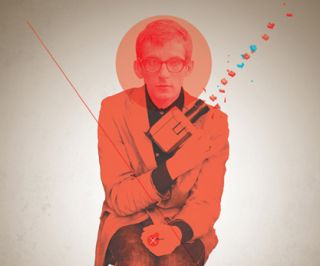
Religion
Science: A Matter of Religion?
On science, certainty and Polish cinema
Posted November 25, 2014
Krzysztof Kieślowski was born in Warsaw at the height of the Second World War. Raised a Roman Catholic under Nazi occupation in a country that would later become a bastion of Communism, he spent his life in a world assailed by ideology.

Krzysztof Kieślowski
Without any real career goals or sense of purpose, he became one of Eastern Europe’s most renowned filmmakers almost by accident. Arguably his greatest work is a series of ten hour-long allegories dealing with the Ten Commandments, 'Dekalog'.
The first of these deals with idolatry and the worship of ‘false gods’. Krzysztof, a university professor and computer scientist, lives alone with his son, Paweł. Together they program a personal computer to take into account time zones to determine whether his mother will be sleeping or awake. When Paweł asks the computer what his mother dreams of, he is disappointed that it is unable to tell him. His father shuns religion and mysticism in favour of methodical and systematic observation and they calculate that the ice on a local lake will be more than thick enough to hold Paweł’s weight. The chaos and randomness of the world in which they inhabit reaches a peak when, out skating on the lake, his son crashes through the ice and dies. Krzysztof cannot comprehend that his calculations did not come to bear, that a single formula on a computer screen could not have prevented his son’s death.
It would be a mistake to view the piece as a criticism of science, mathematics or an empirical worldview. Whilst Kieślowski was indeed religious, he maintained that his faith was ‘personal and private’; instead, the work is a stunning indictment of the dogmatic and simplistic view that the world is bound to conform to one’s ideological beliefs.
With the fall of communism, the decline of organised religion and increased scepticism of mysticism, one might be forgiven for thinking Kieślowski’s point is no longer relevant. Science, by its very definition, is rooted in observation, its tenets dictate that hypotheses must have predictive power and hold true in all cases to be fully satisfactory. So, for the scientist, is ideology dead as a dogma that lieth in a ditch in the face of empirical enlightenment?
The argument often put forward by theists who feel assailed by the rise of scepticism that science is, in itself, a religious belief has never been convincing. As Tim Minchin less-than-delicately puts it,
“Science adjusts its views based on what's observed.
Faith is the denial of observation so that belief can be preserved.”
And yet, there countless occasions of individual scientists placing their faith in unjustifiable beliefs or vehemently jumping to flawed conclusions simply because they fit with their worldview. The majority of these are harmless; the nonsense comes out in the wash that is peer review. That said, I have read countless papers where the authors are clearly convinced of some point and are more than understandably liberal with their deductions from the evidence that they have produced. When someone spends years of their life and many hundreds of thousands of pounds to validate a hypothesis, there will always be some bias towards its acceptance, particularly when it fits with one’s general view of how a system might work. Yet, these articles, often published even in high-impact, well-respected journals, will be accepted at face value by almost every student, researcher and member of the public who reads them.
Part of the problem with uncritical acceptance of new scientific information is that it is entirely necessary. I have no real evidence for even the most fundamental building blocks of my own worldview; I have never personally and unequivocally demonstrated that DNA is transcribed into RNA and then translated into protein, and yet this has become what the late Francis Crick called ‘the central dogma of molecular biology’. As long as someone else has demonstrated this, I am happy to believe it. If it were untrue, nothing about modern science would work, when it clearly does. An engineer does not have to reinvent the engine or elucidate the mathematical possibility of flight before building an aeroplane; the fact that they exist and stay up in the air most of the time is proof of concept enough.
The dangers are twofold then, when it comes to drawing conclusions from any scientific principle. The first is the misreporting of evidence, which is a slight consideration until you reach the very latest, as-yet unrepeated experiments. Secondly, the extension of good science beyond its reasonable bounds will always create a problem. The unassailable and exhaustive evidence behind evolution by natural selection is beyond the scope of this article, but the way that this most elegant and fundamental of understandings has been repeatedly hijacked by eugenicists, racists and salivating ne’er-do-wells to serve their agenda under the misnomer of ‘Social Darwinism’ is significant. It becomes the social equivalent of Kieślowski’s engineer, applying a single line of algebra before taking a leap of faith into a complex and chaotic situation, and it can lead only to us crashing through the fragile ice and into the waters below.
Simply because science happens to be empirically justifiable, externally validated and for all intents and purposes, correct, does not therefore prevent some individuals from using it as a pseudo-religious crutch to explain away a fundamentally frightening and chaotic universe. Accepting information at face value and on authority, whether it comes from someone in a lab coat or in a dog collar, is a high-risk strategy. The only solution is to accept that there are few certainties to any given paradigm, despite our desperate need for certainty and order. Something has to work pretty well as an explanation before it can even be considered as a definitive truth. The result then is a set of scientific beliefs that don’t necessarily satisfy our most fundamental questions, but leave us with justifiable beliefs and a profound desire to stretch the limitations of our knowledge.
Science may be objective, but scientists certainly are not.

